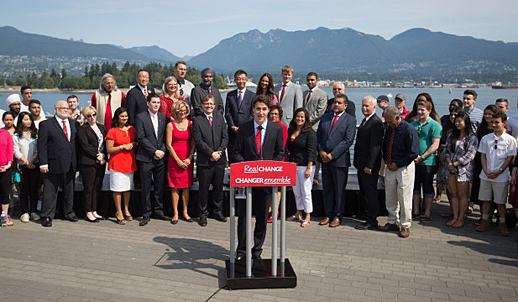In every election, there’s a turning point, a moment in time that becomes indelible in the Canadian political consciousness, and that moment occurred on Monday evening at the Munk Debate in Toronto, when Justin Pierre James Trudeau emerged, once and for all, as the Canadian federal political leader for a new millennium, and when we came to see Stephen Harper’s churlish tenure as Prime Minister for what it always was: an aberration, a political history Canadians will not reflect kindly upon in the years to come.
Fifty-eight days into Canada’s 42nd federal election campaign, federal Liberal Party leader Justin Trudeau has finally found his voice, and is uttering the language of hope Canadians most want to hear …
“I am my father’s son. I stand for the same values and principles for which my father stood. Make no mistake, the Canadian Charter of Rights and Freedoms remains a central feature of my father’s legacy, as does a multicultural Canada and respect for diversity. Not to mention, it was my father who lowered the voting age from 21 to 18, sought to keep government out of the bedrooms of the nation, extended Canada’s territorial waters to 200 miles, and with the passage of the Canada Health Act restricted provinces from privatizing health care.”
Make no mistake, Pierre Elliott Trudeau is a beloved Canadian political figure.
When Tom Mulcair invoked the memory of the War Measures Act, Justin Trudeau turned the tables on the NDP leader for one of the night’s most memorable moments, as he embraced his father’s record in a way he’d not done previously. Pointing out that it was the anniversary of Pierre Trudeau’s death may have been unfair, since it’s unlikely Mr. Mulcair had any idea when he negatively invoked his memory, but it was effective — and so wounded the NDP leader and his party that the NDP will not recover from the gaffe.
Meanwhile, a wearied Stephen Harper appeared as a vacant vessel on the Munk Debate stage, an uncomfortable and discomfiting old man who wished on this night of change that he could be anywhere else but on that stage.

All Politics is Local
Now that Justin Trudeau has emerged as the electable, popular and populist agent of change on Canada’s federal political scene, the impact for Conservative and New Democratic party candidates across Canada may be seen as, at best, prejudiced.
In British Columbia, Liberal “bubble” candidates may very well carry the day: it is entirely likely Terry Beech will emerge as the winning candidate in Burnaby-North Seymour, Judy Higginbotham could well take Surrey-White Rock from former Surrey Mayor Dianne Watts, lawyer Carla Qualtrough could win Delta for the Liberals, Translink public affairs manager Ken Hardie could come from behind for a win in Fleetwood-Port Kells, Lawrence Wells’ prospects in Richmond Centre all of a sudden look much better, as is the case with Jody Wilson-Raybould in Vancouver Granville and Joe Peschisolido in Steveston-Richmond East, while Jonathan Wilkinson in North Vancouver appears primed to take that seat in a walk, as is the case with Sukh Dhaliwal in Surrey-Newton, Canadian Armed Forces Lieutenant-Colonel Harjit Sajjan in Vancouver South, and Pamela Goldsmith-Jones in West Vancouver-Sunshine Coast-Sea to Sky, not to mention Liberal incumbents Joyce Murray in Vancouver Quadra and Dr. Hedy Fry in Vancouver Centre, for whom electoral support is rock solid. All told, potentially winning Liberal candidates in B.C. constitute the lucky 13, for a 650% increase over 2011.

Canadians are about to witness, and be participants in, a generational change in political leadership in Ottawa, a dramatic political transformation that will see the influence of baby boomers give way to a younger and more vibrantly alive, alert and attuned millennial generation, all the members of which have very different ways of seeing the world, connecting and working.
In Canada, we are about to come out of a decade of lost leadership.
In Justin Trudeau, over the course of the next 19 days, Canadians will increasingly come to realize that it is Mr. Trudeau who offers change and hope for Canada’s future, and a new political vision founded in a higher sense of ethics and values, a new generation who will bring along with them new perspectives and ideas, and the energy and boldness to achieve them.
For the first time in almost 50 years, even in this cynical unforgiving age of ours, Canadians are about to be party to a dynamic, engaging and contemporary manifestation of Trudeaumania, and a hope for Canada’s future that is one based on generosity and reason, fairness and social justice, wisdom and security. In twenty days, on election day, Monday, October 19th, a record number of millennials will take to the polls, in the process transforming Canada into what once was, and can be again.